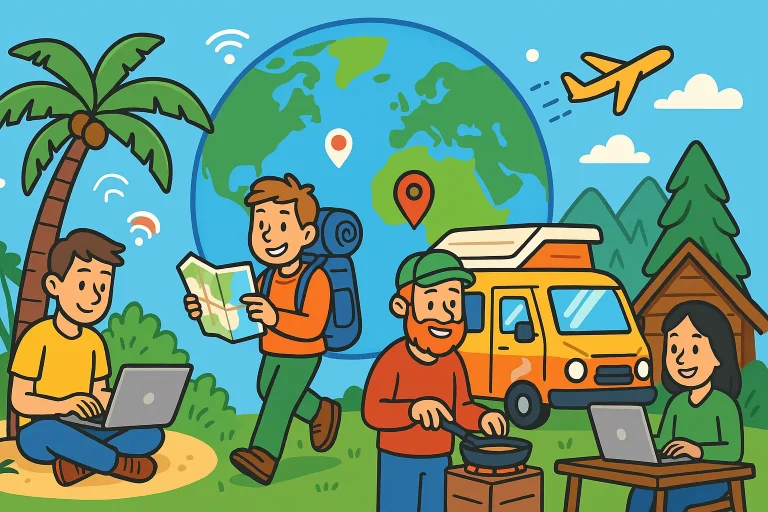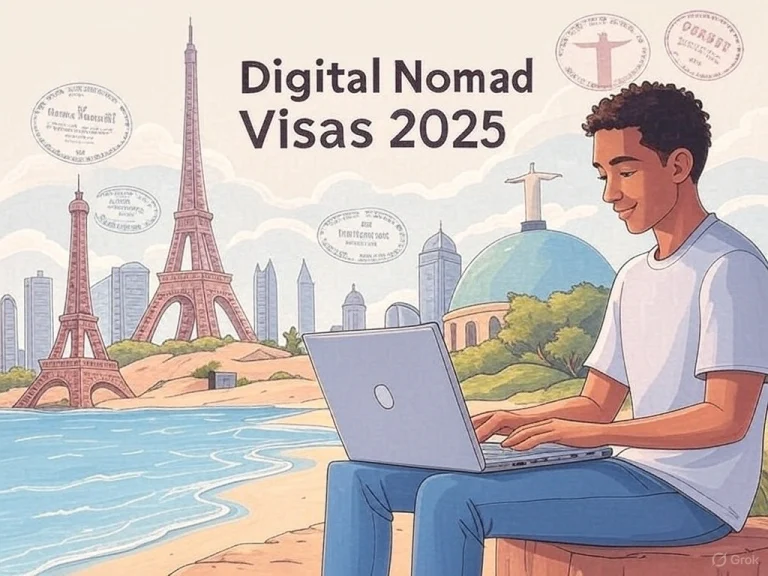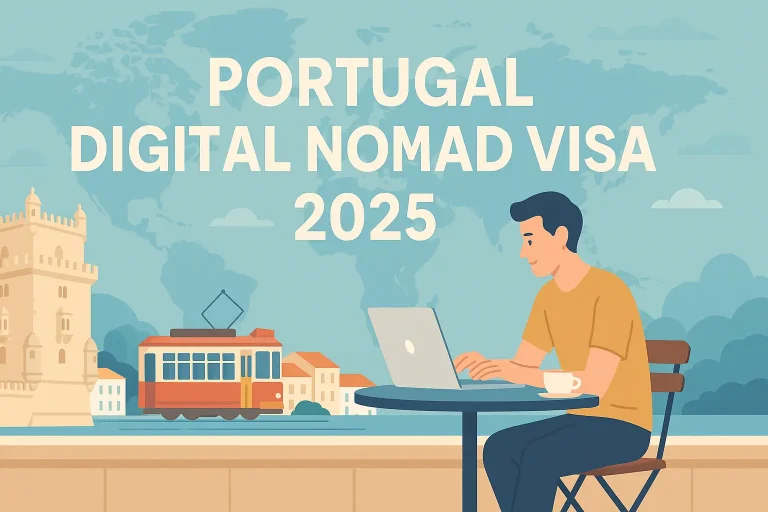Hacked on the Road? Here’s How Digital Nomads Can Stay Safe Online
You’re sipping a flat white in a beachside café in Bali. Sun’s out, Wi-Fi’s strong, and work’s flowing, until your…

You’re sipping a flat white in a beachside café in Bali. Sun’s out, Wi-Fi’s strong, and work’s flowing, until your screen flashes: “Unusual login detected.”
That’s how it starts. For many digital nomads, the freedom to work anywhere can come with hidden threats. Hackers, scams, and data thieves don’t care if you’re in Tulum or Tokyo, they just see a target with a backpack full of devices.
But here’s the good news: you can stay safe without losing your freedom. In this guide, you’ll learn simple, powerful cybersecurity habits to protect your digital life, no IT degree required.
The Wake-Up Call: Real Stories from the Road
Let’s get real.
Eduard, a travel blogger working out of a sunny co-working space in Barcelona, had his laptop swiped while grabbing lunch. When he got back, it was gone, along with weeks of work. Worse? The thieves started trying to log into his accounts.
Another nomad nearly got hacked just by connecting to the wrong café Wi-Fi. A hacker set up a “fake” hotspot that looked like the real one. Boom, his data was intercepted before his coffee even cooled.
These stories aren’t rare. They’re happening every day, and they’re costing people time, money, and peace of mind.
Why Nomads Are Easy Targets for Hackers
You wouldn’t walk through a crowded market with your wallet wide open. But many nomads unknowingly do just that, with their digital lives.
Here’s why:
- Public Wi-Fi is everywhere… and often unsafe
- Personal devices lack corporate-level protection
- Frequent travel means more chances to lose gear
- Online scams are tailored to remote workers
- Passwords? Often reused, simple, or guessable
Add the stress of traveling, new languages, and different laws, and you’ve got a recipe for digital disaster.
But don’t worry. We’ve got the playbook to stay safe.
First Line of Defense: Lock Down Your Internet Connection
Public Wi-Fi: The Free Coffee of Hackers
That café Wi-Fi might be fast, but it could also be a trap.
Hackers love setting up fake hotspots, sometimes called “Evil Twins,” with names like “Cafe_Guest” or “Free_Airport_WiFi.” Once you’re on, they can steal everything you type, passwords, messages, even credit card info.
How to Outsmart the Bad Guys
- Always use a VPN. It’s like a secret tunnel for your data. Good ones include NordVPN, Surfshark, and ExpressVPN. Avoid the free ones, they’re often sketchy.
- Double-check network names. Ask the café or hotel staff before connecting.
- Turn off auto-connect. Prevent your phone or laptop from jumping onto random networks.
- Don’t bank or shop online while on public Wi-Fi, even with a VPN. Wait till you’re on a secure connection.
Bonus tip? If you’re unsure, tether your phone’s data instead. It’s safer than most public Wi-Fi.
Device Defense: Keep Your Gear Safe from Thieves
Theft Happens Fast
Whether it’s a train ride in Vietnam or a late-night hostel in Lisbon, devices go missing, fast. And when they do, your data could go with them.
Easy Wins for Physical Security
- Use an anti-theft backpack. Look for hidden zippers and slash-proof material (Pacsafe makes great ones).
- Attach a laptop lock. Especially in co-working spaces.
- Hide your tech. Don’t flash your MacBook in sketchy spots.
- Use tracking tags. Apple AirTags or Tiles can help you find stolen gear.
- Record serial numbers. If you lose it, this can help with recovery or insurance claims.
Eduard, the blogger who lost his laptop? He said he wishes he’d just used a $20 cable lock.
Your Secret Weapon: Strong Passwords and MFA
One Password to Rule Them All? Nope.
Using the same password everywhere is like using the same key for your house, car, and safe. If one gets stolen, everything’s compromised.
Make Passwords Work for You
- Use a password manager like Bitwarden, Dashlane, or 1Password
- Create unique passwords for every site
- Make them long and weird, think “Pizza$Banana!Cloud2025”
Add a Second Lock: MFA
MFA (multi-factor authentication) is a game-changer. It asks for a second code, like from an app or text, before logging in. Even if hackers get your password, they’re locked out.
Go even safer: use authenticator apps (like Google Authenticator or Authy) over SMS codes, which can be hijacked.
Backup or Break Down: Protect Your Work
Imagine this: you lose your laptop and everything on it, client files, tax info, personal photos, gone.
Don’t let it happen.
The Backup Rule of 3
- Cloud Backup: Services like Google Drive or Dropbox
- Local Backup: External hard drive (keep it separate from your laptop)
- Encrypted Copies: For sensitive docs like passports or visas
Set it up once, automate it, and breathe easy knowing your data’s safe, even if your gear isn’t.
Keep Your Info Away from Prying Eyes
Encrypt Everything
Most laptops and phones now let you turn on full-device encryption. This scrambles your files, making them useless to thieves unless they have your password.
Privacy Screens: No Shoulder Surfing
Working in a café? Use a privacy screen, a thin cover that makes your screen look black to people beside you. No more nosy neighbors spying on your bank logins.
What About Rogue Emails, Scams, and Job Offers?
Social Engineering: A Fancy Name for Tricking You
Hackers often don’t need to hack, they just ask. Scammers send fake emails that look like real companies. Some offer fake jobs. Others say you’ve won a prize.
Don’t Get Hooked by Phishing
- Never click weird links in emails
- Double-check email addresses (a real one: [email protected] / fake: [email protected])
- Be skeptical of offers that seem “too good to be true”
- Use sites like HaveIBeenPwned.com to see if your emails or passwords were leaked
Scammers are getting slicker. But a little awareness goes a long way.
Banking Abroad Without Losing Your Shirt
Safe Money Moves
- Use official apps from your bank
- Turn on transaction alerts to catch strange charges
- Don’t bank on public Wi-Fi unless you’re using a secure VPN
- Keep a backup card in a different bag
Pro tip: services like Revolut or Wise offer smart global banking with good security and low fees.
Digital Hygiene: The Cleanliness You Can’t See
Update Everything, Always
Your phone or laptop says “Update available”? Don’t hit snooze.
Updates often patch security holes. Hackers exploit outdated apps the way burglars love unlocked windows.
USB Charging Scams? Yep, That’s Real
Public charging stations at airports and malls can be hacked to inject malware. Instead:
- Use your own charger
- Or bring a USB data blocker that only allows charging, not data transfer
Know the Rules, Wherever You Go
Every Country Plays by Different Rules
Some places have strict data laws. Others might force you to unlock your phone at the border. Before heading somewhere new, check:
- Government travel advisories
- Local cybersecurity alerts
- Whether certain apps or VPNs are blocked
Pro tip: in some countries, it’s safer to disable biometric logins (face/fingerprint unlock) before crossing borders.
Travel Insurance: Just in Case
While not a security tip, insurance that covers electronics can be a lifesaver. Look for plans that include theft and damage and make sure to report losses quickly if something happens.
But remember: insurance doesn’t get your data back. That’s why backups, encryption, and passwords matter more.
Final Words: Stay Free, Stay Safe
Being a digital nomad is one of the most rewarding ways to live and work. You get the freedom to explore the world on your terms, but with that freedom comes responsibility.
Cybersecurity might sound techy or boring. But think of it like locking your door at night. You’re just protecting what matters, so you can focus on what you love: travel, freedom, and work that excites you.
TL;DR Checklist for Nomad Cyber Safety
- Use a VPN, always
- Don’t trust public Wi-Fi without checking
- Lock up devices, use AirTags, and be discreet
- Backup your files, cloud and physical
- Use a password manager + MFA
- Update software often
- Avoid sketchy links or offers
- Be careful where and how you bank
- Know local laws and risks
- Consider travel insurance for gear
“No, you don’t need to be a tech wizard. Just a smart traveler.”
Every safe step you take is another mile you can go, worry-free.






